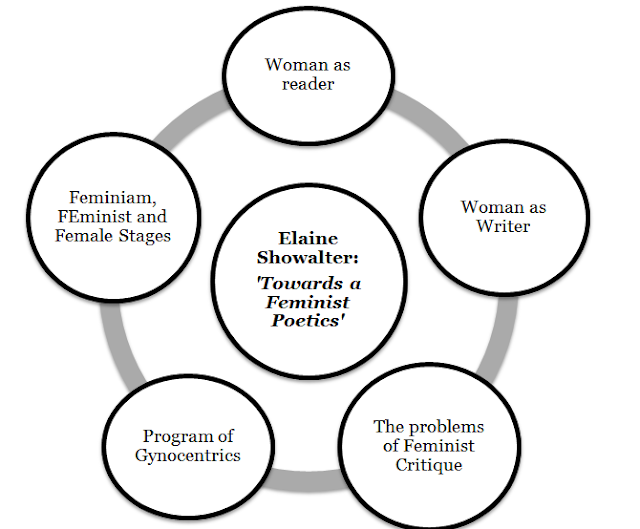Hello Friends,
While
talking about ‘Feminism’ many people take this as it is rebel of women
as anti-man. No, it is not so. They are not able to grasp very basic idea of
feminism. Not only is that but this also problematic for them we are talking so
loudly about feminism. Certainly they have made feminism a slippery term, with the lack of deeper significance and actual findings! Though feminism has widely spread, it is deeply
influenced by patriarchy and it just because we are living in society which is
patriarchal and thus, patriarchy is also encoded into the language itself and
if language is patriarchal then the very voice of feminism will also be
patriarchal without any doubt.
As we
know, feminism was started as political movement as to ask for economic
equality and political equality and then come to literature and widely spread.
So, let’s have ideas about feminism of Eline Showalter and Gayatri Spivak.
Elaine
Showalter described her ideas towards feminism in her essay “Feminist
Criticism in Wilderness”.
Elaine
Showalter: Towards Feminist Poetics
In
gereral, “Towards a Feminist Poetics’ is one of the well-known names in
the field of criticism and particularly in the field of feminist
criticism. In this essay she tries to
analyses the field of feminist criticism frm the different point of views and suggests
some changes required to make the field more effective. She discusses…
A self-proclaimed “practical deconstructionist feminist Marxist,” Gayatri Chakravorty
Spivak is an Indian scholar who continues to add to many academic
disciplines. She is known mainly for her work in post-colonial studies, but has
also influenced Marxist, feminist, postmodern, and globalization studies.
Spivak
is the first woman of color to be bestowed the title of “University Professor of Humanities” at Columbia. She has
taught at several distinguished universities and has eleven honorary
doctorates. She made a name for herself in academia at the age of 25 when she became the first person to translate Jacques
Derrida’s dense and complex post-structuralist work, “Of Grammatology.” She is
also known for her theories of alterity and strategic essentialism.
Her
most famous piece, “Can the Subaltern
Speak?”, looks at the way certain classes of people
are treated in India and critiques how intellectuals like Foucault and Deleuze
view these people. Like much of her academic work, she uses the concept of deconstruction in this piece to examine the truth behind intellectual
positions such as post-colonialism and post-structuralism. In other words, she
considers and “deconstructs” specific theories related to schools of thought
and how they affect discourse in order to understand the way in which they
intersect with each other.
Specifically,
in “Can the Subaltern Speak?” Spivak deconstructs the concept of silencing or
giving a voice to “the Other.” Spivak argues that the inherent goal of post-colonial studies — to help create a platform for the Other — is problematic
for several reasons.
In
order to understand what she is deconstructing, readers must first know the
meaning of “the Other” and the “subaltern.” The first phrase began as a psychological distinction between “self” and “other.” Then, Edward Said used it to refer to the binary relationship between the
“West” and “non-West”. In this definition, the non-West is seen as “the Other.”
In post-colonial studies, this concept of the Other specifies a sub-group
called the “subaltern native” which has been specifically oppressed by colonizers.
One of the most
outstanding historical developments of the twentieth century was the gaining of
national independence from imperial rule by most of the formerly colonized
countries. Yet, rather surprisingly, many of the leading contributors to
postcolonial theory, including Edward Said, Gayatri Spivak, Homi Bhabha and
others, tend to minimize the significance of national independence and take a
dim view of the nationalist movements, leaders and ideologies that struggled
for it.
Thank You.
Thank You.
Work Cited:
Sheber,
Victoria. “Feminist Theorist Thursdays: Gayatri Spivak.” FEM Newsmagazine, FEM Newsmagazine,
23 Feb. 2018, femmagazine.com/feminist-theorist-thursdays-gayatri-spivak/.
Barad,
Dilip. Elaine Showalter: Towards A Feminist Poetics: The Summary.
Newton K.M. (1997) Elaine Showalter: ‘Towards a
Feminist Poetics’. In: Newton K.M. (eds) Twentieth-Century Literary Theory.
Palgrave, London
Doran, Christine.
“Postcolonialism, Anti-Colonialism, Nationalism and History.” International Studies,
vol. 56, no. 2–3, Apr. 2019, pp. 92–108, doi:10.1177/0020881719840257.
Nayar, Pramod K. An Introduction to Cultural Studies. Viva Books, 2011.


No comments:
Post a Comment